
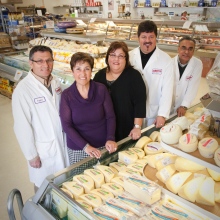
Photo by Sandra Strangemore
If cheese really is milk’s great leap towards immortality, as the renowned American writer and broadcasting pioneer Clifton Fadiman once put it so deftly, it would be a pretty safe bet that the folks in charge of Hamilton, Ont.-based cheesemaker Salerno Dairy Products Limited are in it for the long run.
Founded in 1962 by Carmine Marzaro, who left his native Italian province of Salerno to start a new life in Canada, the family-owned producer of Italian-style cheeses has already experienced all the key trappings of living the classic Canadian dream—escaping poverty in the old country,
striking gold in the New World, diversifying to serve an increasingly multiethnic client base—and the future could hardly look brighter.
“We now sell our cheeses all over Canada, the U.S. and the world,” says Robin Ghosh, general manager of the company’s 120,000-square-foot central manufacturing facility, located in a busy industrial park on the outskirts of Canada’s steelmaking heartland.
GROWING REACH
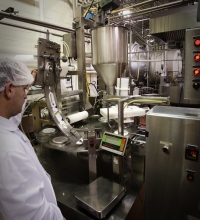
Photo by Sandra Strangemore
“Our overseas sales are now a growing niche market for us, with our products being exported to Mexico, Middle East, Korea and even Africa,” Ghosh told Canadian Packaging on a recent visit to the Hamilton facility, which employs 150 people on a three-shift, six-days-a-week schedule to produce over six million kilograms of cheese products per year. Now owned by the second-generation Marzaro family clan, the Salerno plant—housing 12 production and seven
packaging lines under its roof—supplies nearly 70 per cent of its output to foodservice industry customers, according to Ghosh.
“The foodservice sector is very important for us; we supply cheeses to institutions, pizza retailers, and other types of further-processors and food manufacturers right across North America,” Ghosh explains.
About 15 per cent of the plant’s production is dedicated to co-packing cheese products for other food companies, according to Ghosh, with the remainder finding itself retailed under the Salerno brand label throughout major Canadian supermarket chains such as Loblaws, Zehrs, Fortinos, Sobeys and Superstore.
Producing and processing its cheeses in all the popular formats—whole, shredded, grated, brick, etc.—Salerno has made a conscious effort in recent years to expand its product portfolio in a way that more accurately reflects Canada’s ever-evolving consumer base, Ghosh relates.
“Canada is obviously a very ethnically-diverse country, so we began presenting a wider variety of cheese recipes from around the world to reflect this multicultural mélange,” says Ghosh, citing the company’s growing offerings of Kosher and Halal-certified products, as well as pasteurized-only and low-fat cheeses.
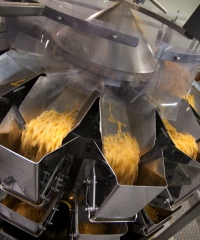
Photo by Sandra Strangemore
Still, the company’s Italian roots are well-reflected in the fact that the production of soft cheeses such as Bocconcini, Ricotta and Mascarpone, semi-soft varieties like Mozzarella and Provolone, and hard-cheese classics Caciocavallo, Crotonese, Parmesan, Romano, etc., account for the greatest share of Salerno’s sales and output.
“Mozzarella is the cheese we produce in the greatest volumes,” says Ghosh. “It is a big niche for us, and because we have the ability to produce many other types of cheeses—unlike many of our competitors who only make Mozzarella—we have successfully exploited this niche to become a true competitive force in the industry.”
Despite its solid competitive credentials, Salerno is certainly not the type of company to take its hard-earned success for granted—especially in the context of a mid-sized firm having to compete against multinational food giants with vastly deeper pockets and greater economies of scale.
To defend and grow its market share, explains Ghosh, Salerno is constantly reinvesting in new production machinery and streamlining its workflow process to remain a high-productivity manufacturing enterprise.
SIZING UP
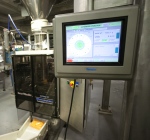
Photo by Sandra Strangemore
“Our size offers us an opportunity to be flexible in the way we operate,” he reasons. “Because our runs aren’t as great as some of the larger-scale cheese producers, and because we’re not running extremely
high-speed equipment, we can have product changeover done in a relatively short time—meaning we can easily accommodate special, smaller-run customer orders,” he explains.
Because Ghosh’s job comes with the responsibility of making sure that all of the plant’s multiple production and packaging lines are always performing at optimal efficiency, “I am always on the look-out for equipment that can perform better than what we currently have,” he confides.
Last summer, his open-ended search for better equipment led to the purchase of a new Repak RE25 horizontal form/fill/seal packaging machine—a stainless steel, washdown-ready, vacuum-packing system that Salerno now uses to package big blocks of Mozzarella cheese ranging from one to five kilograms.
“It’s a very good and fast machine,” extols Ghosh. “I can honestly say that there is absolutely nothing wrong with its performance. “I can’t even comment about Reiser’s service for it yet because it’s really been problem-free for us so far.”

Photo by Sandra Strangemore
Manufactured by the Canton, Mass.-based food processing and packaging equipment group Reiser, which operates its Canadian subsidiary in nearby Burlington, Ont., the Repak RE25 utilizes an innovative ‘rapid air forming’ technique to achieve highly effectively distribution of film onto all of the cheese-blocks’ corners.
This feature has allowed Salerno to start using a thinner forming film, Ghosh reveals, translating into noticeable film savings.
Ghosh says he is also impressed with the machine’s four-point lifting system on the forming and sealing dies that generates very strong closing pressure—ensuring better package integrity and reliability.
Moreover, the machine’s modular construction allows Salerno the flexibility of lengthening its footprint with a simple addition of a few components, or even altering its web widths to accommodate changing requirements.
“This is a very nicely-designed machine,” says Ghosh. “I am certainly not the type to purchase new equipment just for the sake of having new equipment, but this is definitely a machine that can grow with us.”
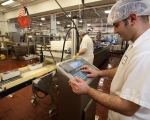
Photo by Sandra Strangemore
Above all, the RE25 really delivers on its promise of improving the product’s shelf-life performance, according to Ghosh.
“It has a side vacuum that takes out more water—an important thing for us, because having excess water staying within the package actually reduces the vacuum seal performance,” he explains.
“The RE25 gives us a much better vacuum-pack, which ensures our cheeses get the maximum shelf-life that we believe they should have,” says Ghosh, while complimenting flexible packaging producer Packall Packaging Inc. of Brampton, Ont., for supplying the high-quality pre-printed top film used on the Repak machine, along with the clear bottom film supplied by Cryovac.
In addition to the RE25 machine, Reiser also supplied Salerno with a Super-Vac GK169B vacuum chamber packer—utilizing a Digimat 5 computer control for packaging odd-shaped cheese cuts—and a Holac AUT 200 dicer, claimed to be one of the largest cheese-cutting machines in the market.
SLICE AND DICE
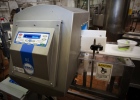
Photo by Sandra Strangemore
“It comes with multiple cutting grids that we can easily swap out to produce various sizes of shredded or grated cheeses,” explains Ghosh. “With its innovative feed system, we can process four- to five-pound blocks of cheese fast enough to utilize our two Hayssen packagers at the same time.”
Manufactured by Hayssen Packaging Technologies, the two Ultima ST vertical form/fill/seal baggers both boast high-precision 14-head Yamato scale checkweighers for accurate measuring and dispensing of shredded and grated cheeses produced by Salerno.
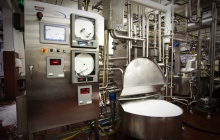
Photo by Sandra Strangemore
Advertisement

